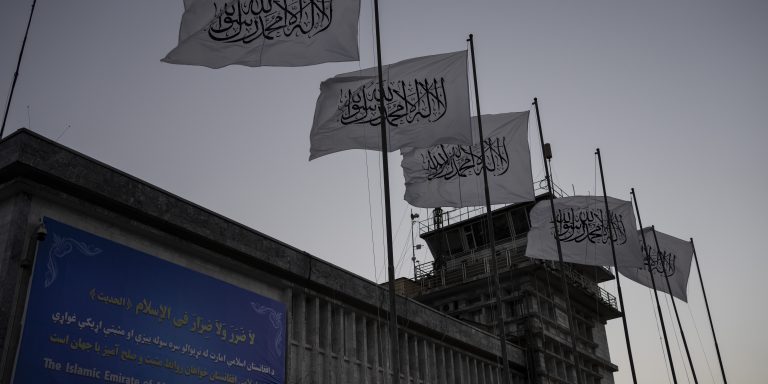INTELBRIEF
September 21, 2021
IntelBrief: Gulf States Attempting to Adjust to the Taliban’s Takeover of Afghanistan

Bottom Line Up Front
- Maintaining longstanding U.S. security cooperation with the Arab monarchies of the Persian Gulf has become even more crucial following the Taliban takeover of Afghanistan.
- The Gulf states can help fill U.S. intelligence gaps as well as provide an “over the horizon” capability to strike terrorist groups in Taliban-controlled Afghanistan.
- The Gulf states are concerned about Taliban rule but will work to hold the group and its allies to their anti-terrorism commitments.
- Qatar has agreed to host a U.S. Embassy to Afghanistan until an embassy in Kabul can be reopened, and its technicians worked to restore Kabul’s airport to operational status, elevating its status as one of Washington’s most important allies.
Several of the Arab monarchies of the Persian Gulf states have been involved, to varying degrees, in the more than 40 years of internal conflict in Afghanistan that appear to have ended with the Taliban movement’s second takeover of Afghan governance. Saudi Arabia and the UAE, along with Pakistan, were the only countries to recognize the 1996-2001 Taliban government. All of the Gulf states are longstanding security partners of the United States and, for more than two decades, have hosted bases and other facilities used by U.S. forces for regional security and counterterrorism operations. Between 2001 to 2014, several Gulf states, including the UAE and Bahrain, deployed military and security personnel to assist the U.S. stabilization project there. Saudi Arabia, Qatar, Kuwait and Oman did not have direct involvement in Afghanistan during the period of U.S. military involvement, but all six Gulf states allowed U.S. forces to stage air operations in Afghanistan from their bases.
None of the Gulf states has yet recognized the Taliban-led government formed in early September, but they all are, to varying degrees, engaging with the new rulers in Kabul. All of the Gulf states have at the same time voiced concerns that Taliban-controlled Afghanistan could again become a safe haven for Islamist extremists now that U.S. forces are gone. The United Nations has indicated in recent reports that the Taliban has not clearly broken its tacit alliance with Al Qaeda. Yet, given their ample financial resources, the Gulf states have leverage to press Taliban leaders to uphold their commitments, under the February 2020 U.S.-Taliban Doha Agreement, to prevent terrorist groups from operating in Afghanistan. Saudi Arabia’s close relations with Pakistan, which is the key benefactor of the Taliban in Afghanistan, represents an additional source of influence over the Taliban. Some Biden administration officials, including Chairman of the Joint Chiefs of Staff Mark Milley see the possibility of cooperation with the Taliban against Al Qaeda and the Islamic State- Khorasan (IS-K).
Should an Islamist extremist threat again emerge in Afghanistan, whether at the behest of or against the will of the Taliban, the Gulf states will play a key role in helping the United States compensate for its military absence from Afghan territory. The Gulf bases that U.S. forces use enable the United States to exercise an “over the horizon” counterterrorism strike capability in Afghanistan. Those Gulf states that sent forces to Afghanistan during 2001-2014 also presumably built networks among key tribes and regions of Afghanistan that can potentially help the United States acquire key intelligence about the presence of terrorist groups in Afghanistan under the new Taliban regime. The loss of an intelligence presence in Afghanistan is widely considered one of the main adverse consequences of the U.S. withdrawal. At the same time, allowing the United States to conduct strikes in Afghanistan from the Gulf might complicate Gulf state relations with the Taliban government.
One Gulf state that has been able to take advantage of the political changes in Afghanistan is Qatar. Doha hosted the U.S.-Taliban negotiations that led to the U.S withdrawal, and, has positioned itself as a key interlocutor with the new Taliban regime. Qatar was pivotal to the U.S. evacuation operations in August, and its foreign minister was the first senior foreign official to visit Kabul in early September. Qatar has agreed to host a U.S. Embassy to Afghanistan until an embassy in Kabul can be reopened, and its technicians worked with those of Turkey to restore Kabul’s airport to operational status, spending hundreds of millions of dollars to do so, elevating its status as one of Washington’s most important allies. At the same time, the current arrangement is unsustainable, and the United States needs to offer potential guarantees and guidance to those countries helping the U.S. stabilize Afghanistan in the wake of the Taliban’s victory.